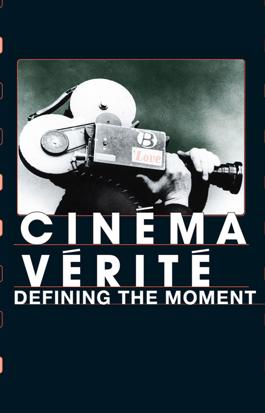Cinéma Vérité: Defining the Moment
Crisis, Lonely Boy, Chronicle of a Summer. You may not know these films, but you see their influences every day--in everything from TV news to music videos to Webcams. The cinéma vérité (or direct cinema) movement of the '50s and '60s was driven by a group of rebel filmmakers tired of stilted documentaries. They wanted to show life as it really is: raw, gritty, dramatic. Rich in excerpts from vérité classics, Cinéma Vérité: Defining the Moment is the first film to capture all the excitement of a revolution that changed movie-making forever. Director Peter Wintonick's Manufacturing Consent: Noam Chomsky and …
Crisis, Lonely Boy, Chronicle of a Summer. You may not know these films, but you see their influences every day--in everything from TV news to music videos to Webcams. The cinéma vérité (or direct cinema) movement of the '50s and '60s was driven by a group of rebel filmmakers tired of stilted documentaries. They wanted to show life as it really is: raw, gritty, dramatic. Rich in excerpts from vérité classics, Cinéma Vérité: Defining the Moment is the first film to capture all the excitement of a revolution that changed movie-making forever. Director Peter Wintonick's Manufacturing Consent: Noam Chomsky and the Media is one of the bestselling documentaries of all time; co-producer Éric Michel won the Cannes Palme d'or for 50 ans, by director Gilles Carle, and co-producer Adam Symansky won an Oscar for Flamenco at 5:15.
-
directorPeter Wintonick
-
producerAdam SymanskyÉric Michel
-
executive producerSally Bochner
-
associate producerKirwan Cox
-
scriptKirwan Cox
-
cameraFrancis Miquet
-
soundPeter Wintonick
-
editingMarlo MiazgaPeter Wintonick
-
sound editingDon Ayer
-
music recordingGeoffrey Mitchell
-
music editingJason Campbell
-
voice recordingPatrick Viegas
-
re-recordingSerge Boivin
-
online editingDenis PilonSylvain Desbiens
-
musicJimmy James
-
archival rightsElizabeth Klinck
-
music clearancesElizabeth Klinck
-
participationJean-Pierre BeauvialaMichel BraultGillian CaldwellRobin CowieRobert DrewJennifer FoxWilliam GreavesGregg HaleWolf KoenigRoman KroitorBarbara KoppleRichard LeacockDouglas LeitermanTerence Macartney-FilgateDonn A. PennebakerPierre PerraultKarel ReiszJean RouchHope RydenFloria SigismondiFrederick WisemanAlbert Maysles
Introduce your students to the birth and development of cinéma vérité. How did it differ from traditional documentary filmmaking? Who was behind it and how did they contribute to the movement? What role did the NFB play? How has cinéma vérité evolved over time and space? Is it used more diversely nowadays? This is a great opportunity to explore one important piece of our cultural heritage in the classroom.
More educational content
Cinéma Vérité: Defining the Moment, Peter Wintonick, provided by the National Film Board of Canada
